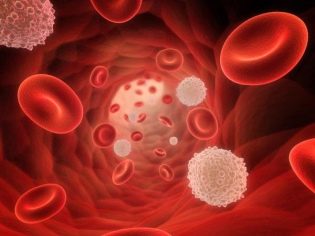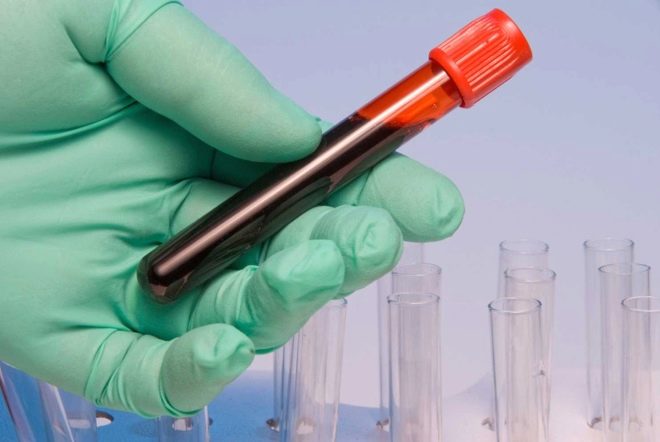What to do if during pregnancy thick blood, and what blood thinning products, enter into the diet?
A frequent problem arising at various stages of pregnancy in future moms is blood clotting. This condition is rather unfavorable and requires mandatory correction. This article will help you figure out what they should do when such a situation arises.
The reasons
During the carrying of the baby, the expectant mother is faced with conducting a huge number of tests. Complete blood count and hemocoagulogram are mandatory tests that are included in the recommended list of laboratory tests performed during pregnancy.
"Thick" blood is a clinical concept, which is defined if the blood significantly increased the number of uniform elements. Usually various disorders of blood clots lead to the development of this situation during pregnancy. These pathologies can manifest themselves both in the earliest and in the latest terms of carrying a baby.
It should be noted that in normal blood is quite liquid. Such a physiological feature is necessary in order to fully implement its transport and nutritional function.
Quite a lot of different nutrients are dissolved in the blood, as well as oxygen. All these elements are necessary for the fetus for its active growth and development.
The development of pathological disorders associated with the formation of thick blood, the impact of the following causes:
Individual features of the future mother. If a woman had any hematologic abnormalities before the onset of pregnancy, then they will make significant progress during pregnancy. Usually this situation occurs in families where several members have various diseases of the cardiovascular system. Having a history of a heart attack or stroke with a close relative of a pregnant woman is also a predisposing factor for increased thrombosis.
Violation of the drinking regime. Insufficient intake of water into the body of the future mother can lead to the fact that her blood becomes thicker. Such a violation occurs quite often if a woman suffers from toxicosis. Frequent vomiting promotes dehydration, which leads to a pronounced thickening of the blood.
Insufficient intake of essential vitamins and trace elements. Vitamin balance is very important in all periods of pregnancy. Carrying a baby is a very energy-intensive time. For the implementation of all biological reactions need enzymes that can not be formed in the mother's body without certain vitamins and trace elements.
Frequent consumption of sweets and other "fast" carbohydrates. A large amount of sugar entering the blood leads to a significant change in its viscosity. If the expectant mother eats a lot of sweets and candies during the whole pregnancy, then this not only can contribute to increased thrombosis, but even leads to the development of her signs of diabetes.
Oversaturation of the body with iron preparations. These funds are usually prescribed to pregnant women who have had a decrease in hemoglobin during childbirth. Excessive use of iron-containing drugs can lead to an increase in platelet count in peripheral blood.
Impaired work of the spleen. This body is necessary for the body to maintain an optimal concentration of blood cells.Hypersplenism is a pathological condition characterized by significant impairment of the spleen.
This pathology that occurs during pregnancy also contributes to the progression of blood clots.
It is important to note that there are also a number of specific pathologies, which occur predominantly only during pregnancy. So, to increase the viscosity of the blood and the violation of its fluidity can lead antiphospholipid syndrome. Doctors note that the incidence of this pathology is only increasing every year.
Severe blood loss or traumatic shock resulting from some kind of injury may also contribute to a change in basic blood counts. These pathologies may also appear if the pregnant woman has signs of internal bleeding. This condition is already extremely unfavorable and requires urgent medical attention.
Implications for the child
Too thick blood in the mother - a very dangerous condition for the fetus. It is most unfavorable if this pathology develops over a long period of time.
For the active growth and development of the future organism it is very important that every second all cells are supplied with blood. Pregnancy is a unique physiological period. At this time, the fetal blood supply is closely related to the mother. Between the two organisms operates a common network of blood flow, which form the placental arteries. They deliver all the necessary nutrients and vitamins to the fetus, as well as spent decomposition products.
How dangerous this condition is for the unborn child is determined only by the doctor. To this end, he conducts a whole complex of diagnostics, which includes both analysis and ultrasound. As a rule, thick blood contributes to the development of adverse symptoms of placental insufficiency over time. This is a rather unfavorable condition for the growth and development of the future baby.
Especially dangerous if this violation occurs in the first trimester of pregnancy.when a child forms all vital organ systems. In this case, as a rule, doctors prescribe a special diet for the future mom, which allows to normalize this situation. If, despite such nutrition, all the symptoms persist, then in such a situation, the prescription of drug therapy is required.
Treatment
If, during pregnancy, a woman has revealed any abnormalities in hemostasis, then she is referred for consultation to a hematologist. This doctor will do the necessary additional research. They are necessary in order to understand what was the true cause of blood clots.
In some cases, doctors resort to prescribing drugs. It should be noted that such treatment is carried out. only under strict medical conditions. With the preventive purpose during pregnancy, tablets that thin the blood are not prescribed, since they can have an adverse effect on the body of the unborn child.
The most commonly prescribed drugs that normalize blood viscosity are antiplatelet agents and anticoagulants. It should be noted that it is strictly forbidden to take such drugs yourself without prior consultation with a doctor! Uncontrolled reception of these funds can lead to a significant aggravation of the situation, and in some cases will contribute to the development of uterine bleeding.
Drugs are often used as blood thinners. based on acetylsalicylic acid or aspirin. It is important to remember that such drugs are contraindicated during the exacerbation of peptic ulcer and in the presence of any signs of internal bleeding in a pregnant woman.
In case of pronounced hemostasis disorders, doctors resort to prescription. injections in the stomach. In this case, special anticoagulant solutions are introduced. These remedies lead to a moderate dilution of the blood without causing dangerous internal bleeding. Such drugs are prescribed only by a gynecologist or a hematologist with mandatory monitoring of blood tests. With the normalization of indicators of this treatment is canceled.
There are also popular methods of blood thinning. Many of them are based on drinking large amounts of fluid. Before conducting any of these types of unconventional treatment should always consult with your doctor.
Some non-traditional methods of therapy can not be used in pregnant women with certain abnormalities during pregnancy.
Special menu
The safest treatment in this situation is diet therapy. She is absolutely safe for the body of the future mom, and for her baby. The main principle of such treatment is compliance with the drinking regimen. A pregnant woman should drink at least 1.5 liters of fluid per day.
The most optimal drink - ordinary water at room temperature. It not only quenches thirst, but also perfectly penetrates the systemic circulation, restoring the lost electrolyte balance in the body. As a beverage, various berry fruit drinks are also perfect. It is better to cook them at home. Seasonal berries are most favorable for a pregnant woman. Perfectly suited cranberries and lingonberries.
If the future mother, in spite of the thick blood, edemas are formed rather easily, then in this case the drinking regime is chosen individually. As a rule, hidden pathologies of the kidneys or urinary tract lead to the development of such a situation. To identify them, requires a more advanced diagnosis and mandatory consultation of the therapist.
To improve the properties and fluidity of blood should always limit the use of all salty foods. It has long been known that table salt, or sodium chloride, strongly retains water. It can also lead to an easy appearance of edema on the body. To eat a lot of canned cucumbers or salted herring during pregnancy is still not worth it. Smoked meats, sausages and sausages are also strictly prohibited.
To improve hemostasis, doctors recommend pregnant women to eat more citrus and other fruits. Such fruits contain a fairly large amount of natural water. It is easily absorbed and quickly reaches the cells of the body.
It is important to note that when taking certain anticoagulants, pregnant women should completely exclude grapefruits from their menu.
Vegetables - another element to maintain healthy blood. They are also filled with plenty of fluid that is quickly absorbed into the bloodstream. To improve blood rheology, doctors recommend expectant moms to eat more of a wide variety of vegetables. The most useful will be those that are present in the menu according to the season.
Doctors distinguish among the most useful vegetables fresh cucumbers. They contain a huge amount of water, which is necessary for the dilution of thick blood during pregnancy. However, it should be noted that it is necessary to use not pickled and barrel salted, but fresh. Salting them at the same time should not be much, as this will only lead to the appearance of edema.
Scientists have long noted that tomatoes are an excellent product for maintaining the correct blood viscosity. The biologically active substances contained in these products have a positive effect on hematopoiesis. It should be noted that these vegetables should not be abused. To obtain all the necessary elements, it is enough just to include 1 tomato in your daily menu.
Fresh berries are an excellent source of vitamins and microelements.which are necessary for the normal course of pregnancy. They also contain quite a lot of natural water, which is needed to improve the rheological properties of blood. You can eat any berries for which the expectant mother does not have allergies.
Such tasty and healthy supplements will not only improve your mood, but also contribute to blood thinning.
About what should be food during pregnancy, you can find out in the next video.































